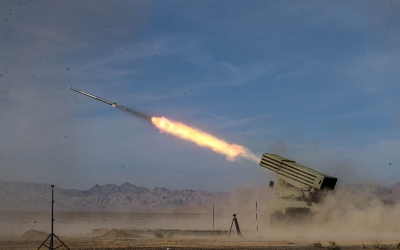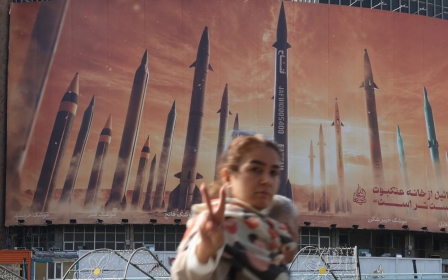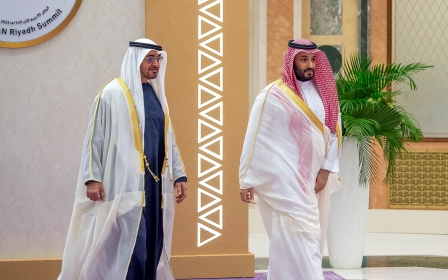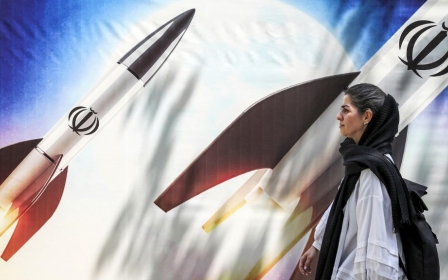Iran's counterstrike has put Israel on notice, but the focus must still be on Gaza
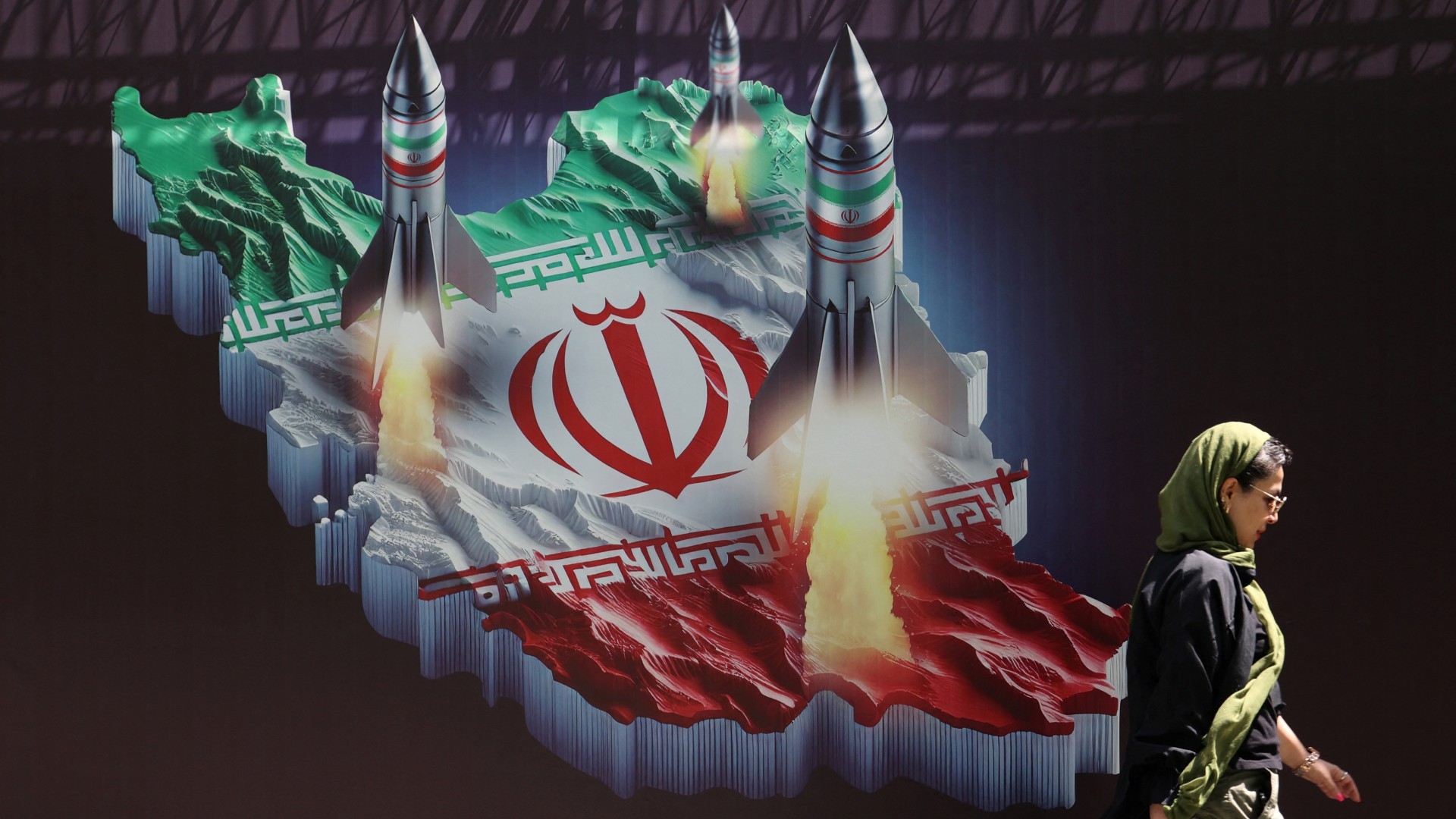
Two weeks after Israeli warplanes bombed the Iranian consulate in Damascus, killing several senior commanders, Tehran retaliated by launching hundreds of drones and missiles at Israel, targeting the country directly for the first time.
The US, UK, France, Jordan, Saudi Arabia and the UAE contributed military forces and intelligence to help defend the settler colony, which for more than six months has been committing a genocide in Palestine.
In the early hours of 19 April, Israel evidently responded in a much more muted way, with several drones shot down over the Iranian city of Isfahan. No casualties were reported, and the matter seems settled, at least for the time being.
But this event will have significant and lasting consequences. Israel is not the omnipotent and omniscient power of the region that it projects itself to be. The 7 October Hamas attacks, followed by Israel’s direct encounters with Hezbollah in Lebanon and now the direct Iranian aerial strikes, have shown this to the world.
Israel is deeply vulnerable. As a Zionist project, it has spectacularly failed in its stated ideological mission to protect the Jewish people. It has, in fact, made them more vulnerable than ever.
Stay informed with MEE's newsletters
Sign up to get the latest alerts, insights and analysis, starting with Turkey Unpacked
It took an array of countries to protect Israel from this inaugural test by the Iranian military. Tehran’s aerial strike was a game changer, no matter how real or subdued the 19 April retaliation was. Iran’s spectacular show of force against Israel was out of character, as Tehran never reacts directly and immediately in the obvious manner of tit-for-tat.
It takes time for a more measured and inconspicuous response, as in the case of the US assassination of military commander Qassem Soleimani in January 2020, followed later that year by the Israeli assassination of a top nuclear energy scientist, Mohsen Fakhrizadeh.
Calculated risk
For Iran, targeting Israel directly was a calculated risk. As the New York Times reported, the strikes upended Israel’s belief about Iran’s willingness to fight it directly: “Israel had grown used to targeting Iranian officials without head-on retaliation from Iran, an assumption overturned by Iran’s attacks.”
Iran gave Israel a taste of its own medicine, administered for close to a century to Palestinians, Lebanese, Syrians and other Arab nations - and made them look astoundingly ridiculous when they spoke of international law.
Follow Middle East Eye's live coverage of the Israel-Palestine war
This brings us to the coalition of US, European and Arab allies that came together to defend Israel. If “the West” can protect Israel against Iran, why can’t it protect Palestinians against Israel? Instead, the concerted effort to protect Israel from Iran’s assault effectively safeguarded the unfolding genocide in Gaza.
A psychological barrier has been crossed. The world has seen Israel under attack, and it took a coalition of states to join forces to defend it
Just one child was reportedly injured in the Iranian attack, which is one child too many. Meanwhile, tens of thousands of Palestinian children have been killed and injured by Israel since October - and not a single one of these countries has lifted a finger to defend defenceless Palestinians.
Jordan and the rest of the Arab world are standing by as their fellow Arabs are slaughtered, while the US and Europe ensure Israel has enough bombs and bullets to kill as many Palestinians as it wants, amounting to what is globally seen as a genocide.
The fact is that corrupt and cowardly Arab ruling regimes, led by Saudi Arabia, are more wary of Iran than they are of Israel, for they don’t think anyone is capable of defeating it - and their own existence is contingent on US support.
But a psychological barrier has been crossed. The world has seen Israel under attack, and it took a coalition of states to join forces to defend it. Breaking this barrier has immense geopolitical consequences for the region.
Put on notice
Israel has now been put on notice that it cannot continue to bully the region while committing genocide in Palestine with impunity. This comes at a time when Israeli objectives in Gaza have miserably failed - a fact that even its chief US mouthpiece, the New York Times, has had to admit.
This is an epistemic shift in the military and diplomatic calculations of the region. For the first time, a Middle Eastern state has demonstrated the material means, technological capacity and political will to strike Israel, forcing the hand of western and Arab powers in sustaining genocidal Zionist rule over the region.
To be sure, this epistemic shift is more to the military and strategic advantage of Iran than to the benefit of Palestinians. This episode should not distract attention from the cause of Palestinian national liberation, with the fight now centred on Gaza. The significantly altered geopolitics of the region will mean little if Israel continues to maim and murder Palestinians at will.
In summary, Israel clearly needs the entire western military apparatus, plus its Arab allies, to defend it. Without this support, the settler colony will collapse. Jordan is representative of all Arab regimes that have lost their self-respect and dignity in failing to stand by Palestinians.
These Arab states are paralysed by their fear of Israel, appearing only too eager to collaborate with the genocidal Zionist regime against their “Arab brethren” in order to preserve their own power. The world’s attention must therefore remain focused on the Palestinian genocide, rather than being distracted by the Israeli-Iranian sideshow.
While regional geopolitics have been significantly altered, the plight of the Palestinian people, and their struggle for the liberation of their homeland, remains the same.
The views expressed in this article belong to the author and do not necessarily reflect the editorial policy of Middle East Eye.
Middle East Eye delivers independent and unrivalled coverage and analysis of the Middle East, North Africa and beyond. To learn more about republishing this content and the associated fees, please fill out this form. More about MEE can be found here.

